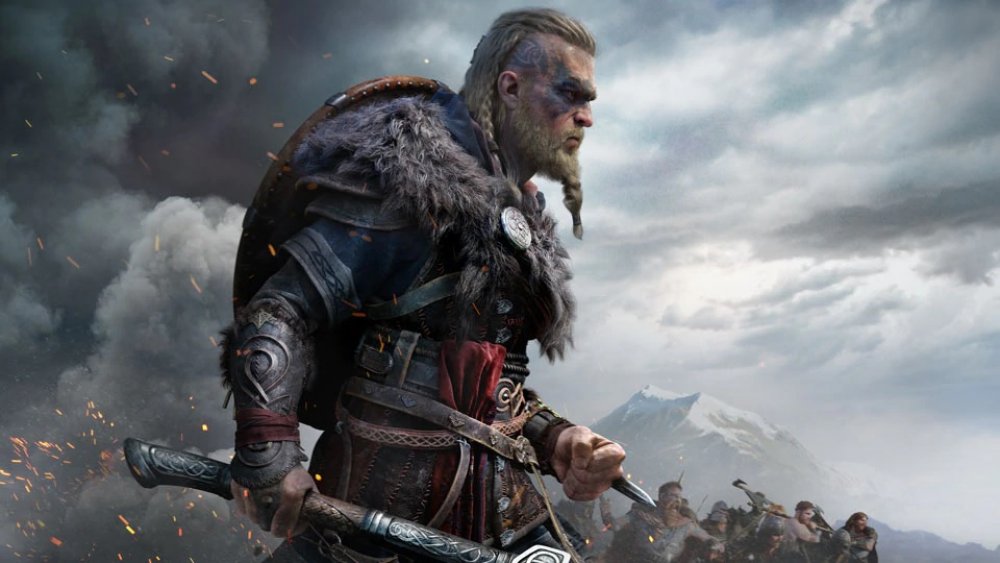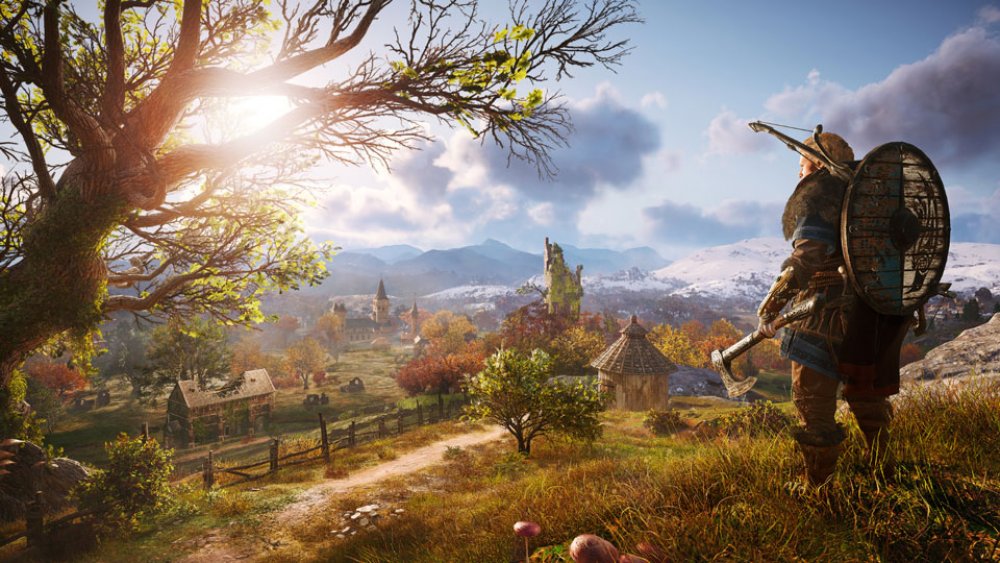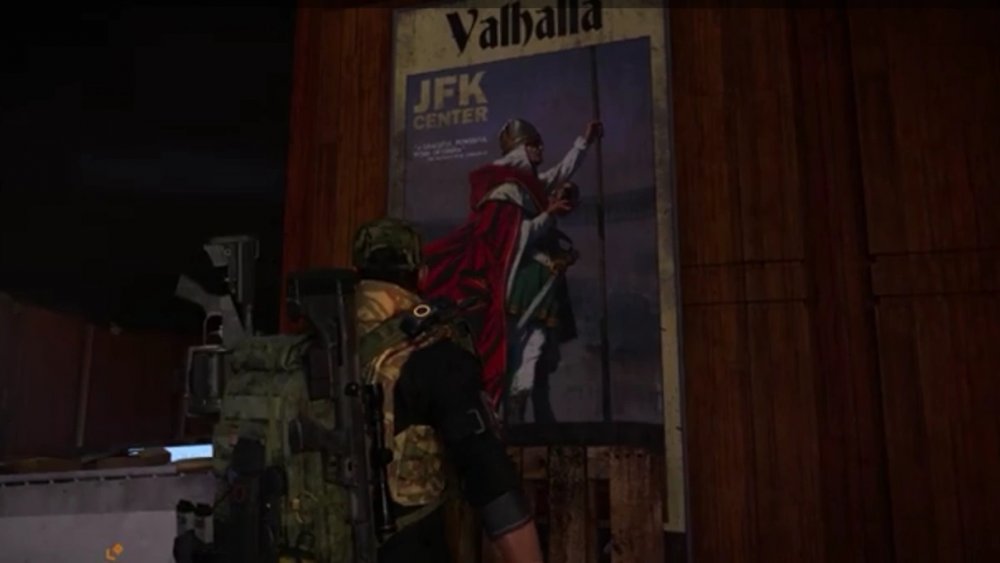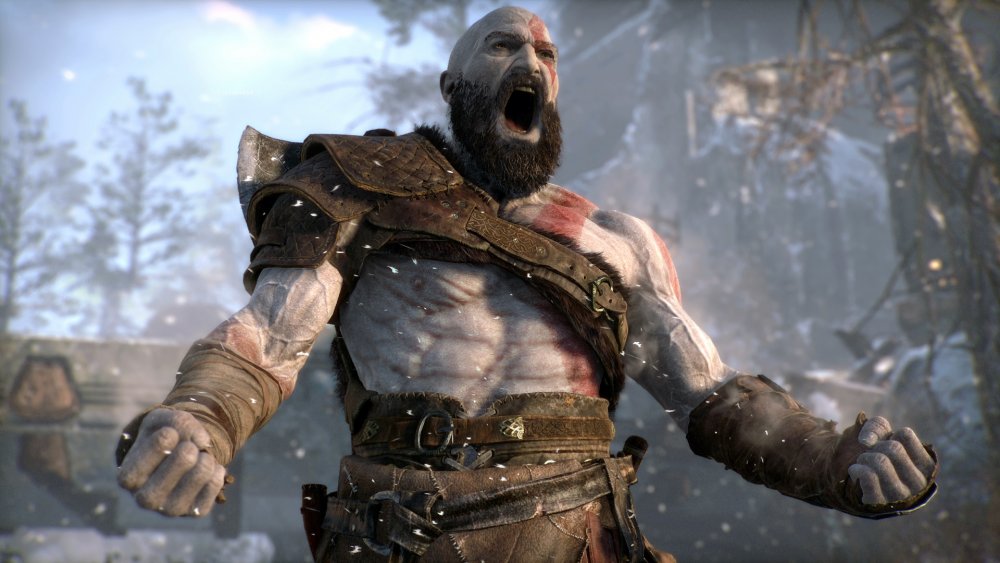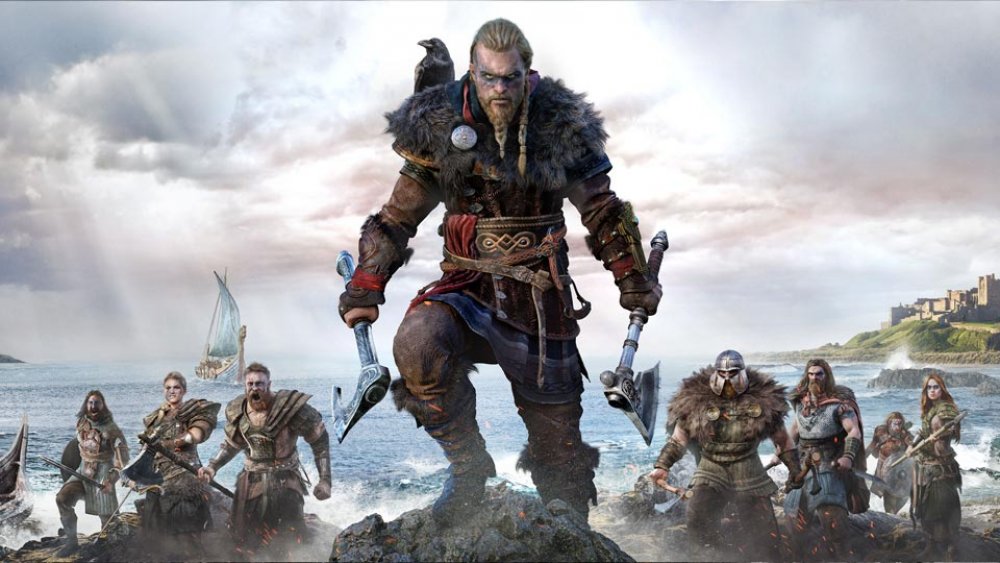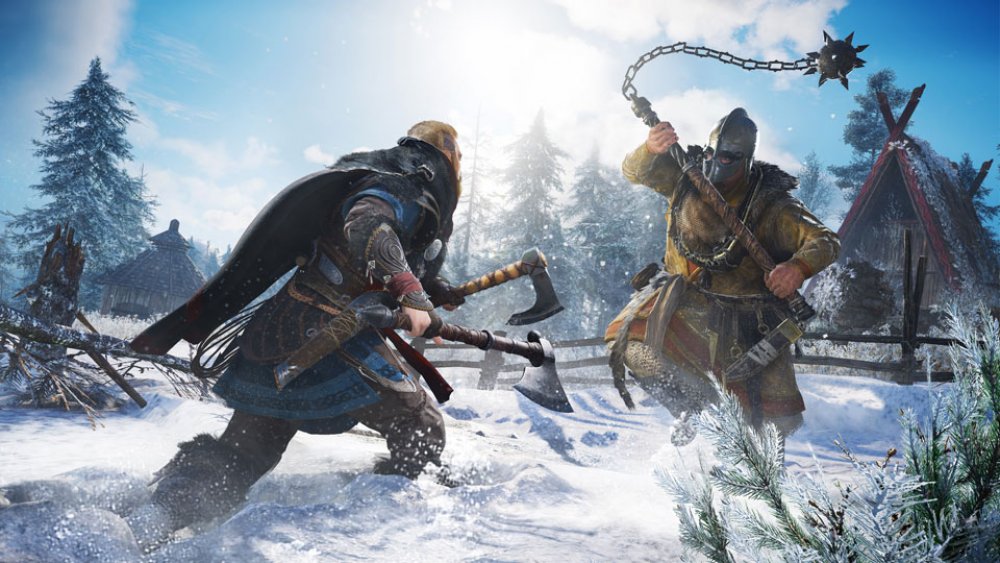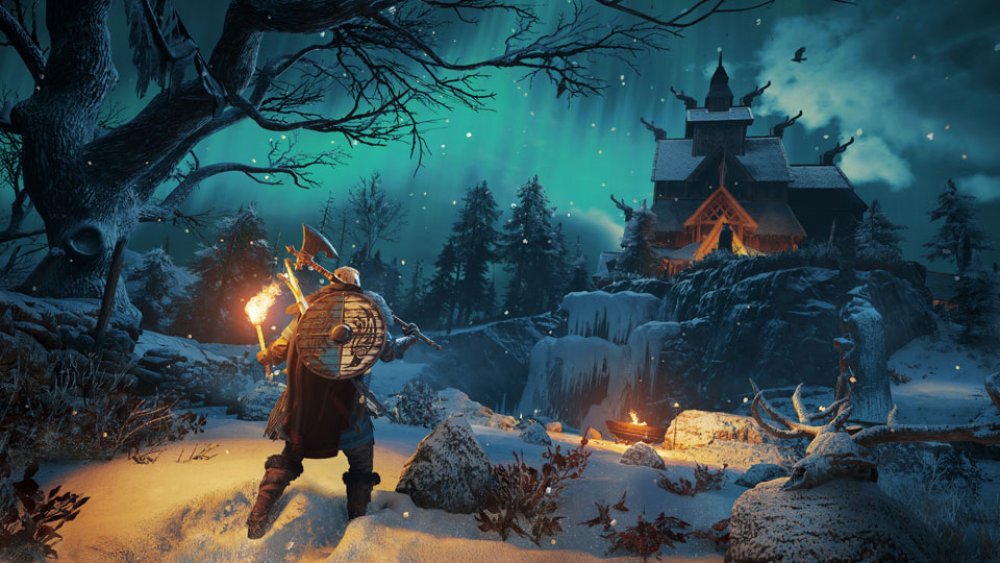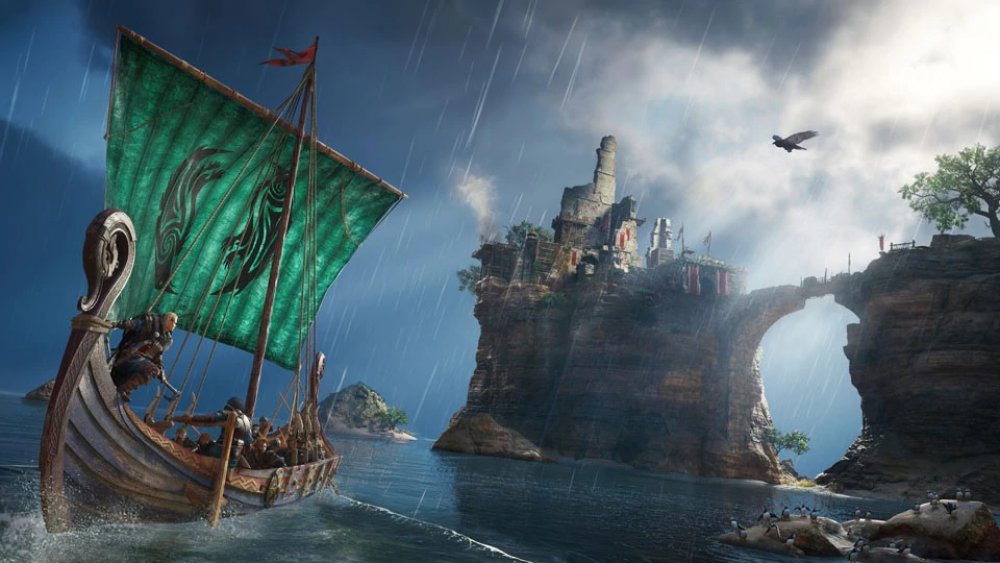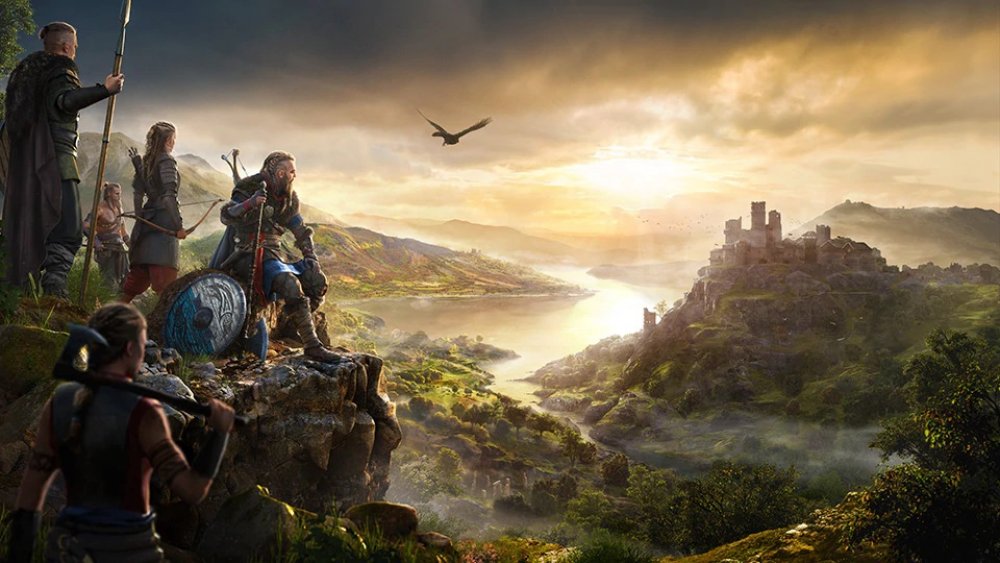The Untold Truth Of Assassin's Creed: Valhalla
Assassin's Creed: Valhalla is the next entry in the immortal Assassin's Creed franchise and the first AC game to grace the Xbox Series X/PlayStation 5 console generation. Before Valhalla was officially announced, every gamer and their grandmother theorized where it would take place. Some thought it would make the leap to ancient Rome, while others believed it would take place in Japan. Imagine everyone's surprise when Ubisoft revealed the game would sit squarely in the Dark Ages and put players in the fur-lined boots of a Viking. After all, Viking warriors are known for screaming across the battlefield and demoralizing opponents before dismembering them, not stealthily sneaking up on guards and taking them out with a knife in the back.
Ubisoft is winning players over with its upcoming definitive — or at least semi-historically accurate — Viking experience. Players can raid towns and villages and dual-wield weapons and shields like a warrior hopped up on mead and mushrooms. But did you know that Valhalla is being worked on by more studios than you have fingers? Or that the game will let you participate in Viking rap battles? Outside of the game's premise, there are a lot of things you may not know about Assassin's Creed: Valhalla. Here are some of the more interesting examples.
Assassin's Creed: Valhalla is being worked on by a whopping 15 studios
The Assassin's Creed games are legendary (and ridiculed) for their size and depth. The games feature enough activities and square milage to keep gamers busy for hours. If you assumed the amount of content stuffed into the games is too much for one studio, you'd be correct. That's why Ubisoft is working with numerous companies to bring Assassin's Creed: Valhalla to life.
According to a post form Ubisoft Montreal's Twitter account, Valhalla's main developers teamed up with 14 co-dev partners, which means a whopping total of 15 studios joined forces on the game. Who is working with Ubisoft? For the most part, nobody knows. One studio, however, did come forward to proudly announce its place among those teams.
On May 14, 2020, Sperasoft revealed it is helping produce Assassin's Creed: Valhalla. Never heard of Sperasoft? Well, it offers a wide variety of services, including engine customization and tool development, creative development, and game porting. This might be the first time you've heard of the company, but you are probably well acquainted with titles covered in its fingerprints. Sperasoft has helped produce Mass Effect 3, Dragon Age: Inquisition, The Outer Worlds, Quantum Break, The Elder Scrolls Online, and Assassin's Creed: Origins and Odyssey. In other words, Valhalla is not Sperasoft's first rodeo.
The infamous Division 2 leak was pure coincidence
Ubisoft is infamous for laying Easter eggs in its games to produce extended universes. Who can forget when players stumbled upon a cave in Far Cry 5 that housed a movie set for Far Cry 3: Blood Dragon? Or how about when Watch Dogs players encountered an Abstergo Industries CEO in Chicago and had to assassinate him? Good times, good times. However, sometimes what players think is an Easter egg is nothing more than a coincidence the size of Italy.
Shortly after the launch of Tom Clancy's The Division 2, players discovered an in-game poster featuring the word "Valhalla." On its own, that word means nothing more than the Norse afterlife, but many gamers paid close attention to the poster because below the word is the picture of a man holding a large golden orb. This sphere could have been either the Holy Hand Grenade of Antioch or one of Assassin's Creed's iconic Apples of Eden. Most gamers, including Jason Schreier, assumed the latter, which led to rumors that the next AC game would feature Vikings. That belief was true but for all the wrong reasons.
While Assassin's Creed: Valhalla has been revealed, the "tease" in The Division 2 wasn't actually a tease at all. According to Assassin's Creed scriptwriter Darby McDevitt, the poster was a huge coincidence and nothing more. In an interview with Stevivor, McDevitt explained, "It's just because The Division is made in Sweden, and they just wanted to put some stuff in there. Whoever the artist was, they just wanted to put in some of their Nordic culture. It had nothing to do with us."
That is quite the coincidence.
Developers are fully aware of any God of War similarities and don't care
When you watched the trailer for Assassin's Creed: Valhalla, you might have thought it was similar to God of War. After all, both franchises followed up stories about carving warpaths through Ancient Greece by traveling to Norse lands. Many gamers couldn't help but compare the two, and even Valhalla's narrative director is joining in on the comparisons. Nonetheless, he is also confident his game won't step on GoW's toes. Nobody wants to do that.
An interview with Darby McDevitt has revealed that, like many people, he played the recent God of War game and enjoyed it. However, he believes Valhalla will set itself apart from Santa Monica Studio's draugr slaughter simulator and won't follow God of War's mythological take on Norse culture.
McDevitt confirmed that Valhalla will be more historically grounded — at least as grounded as you can be in a world where people survive falls from any height if they leap into inertial dampening bales of hay. More importantly, "supernatural" events in Valhalla will be open to interpretation and merely a matter of perspective. That robed figure in the Valhalla trailer who is supposedly Odin might very well be a figment of the protagonist's imagination and not necessarily (as with previous AC games) an actual superhuman entity.
However, while McDevitt claimed Valhalla will be "the ultimate grounded Viking fantasy," you might want to remember that it'll take place in the Assassin's Creed universe, which plays fast and loose with historical grounding thanks to anachronistic inventions like the Hidden Blade. Historical accuracy only goes so far when someone carries a spring-loaded wrist knife in a time before springs were invented.
The jury is out on Viking tattoos
The Assassin's Creed franchise has a blossoming relationship with character customization. Initially, players were limited to one main protagonist with a linear upgrade stick instead of a branching upgrade tree, as well as the occasional optional costume. As the series progressed, more customization options trickled in. Players could mix and match outfit pieces for varying stats, as well as color each piece differently in case they wanted to make their assassin look like the French flag. Eventually, Assassin's Creed games added the option to pick the protagonist's gender, and with Assassin's Creed: Valhalla, players can create their ideal Viking with a variety of beards, hairstyles, and tattoos just like real Vikings. Assuming, of course, Vikings actually had tattoos.
In popular media, Vikings are to tattoos as Michael Bay is to explosions: they are rarely seen apart. Virtually every video game, movie, and show makes Vikings stand out from non-Vikings via heavily-tattooed bodies. However, historians are a little iffy on the whole notion of Vikings wearing more tattoos than armor, which raises the question of how "grounded" Valhalla's self-proclaimed historical grounding is.
Most accounts of Viking tattoos stem from the Arabic explorer and diplomat Ahmad ibn Fadlan, who describes them as being tattooed from their fingers to their necks. However, the Vikings he encountered were traders in what is now Russia, and more importantly, the Arabic word used to describe the tattoos was originally used to describe mosque decorations, not skin decorations. To add to the confusion, many Norse stories that have survived to modern day go into great detail about their characters. The number and placement of scars on a warrior? All accounted for. Hair color? Every follicle described in exquisite detail. Tattoos? Oddly absent.
While Vikings in modern media cannot divorce themselves from tattoos, the historical validity of the tattooed Viking warrior might be about as accurate as dinosaurs in Jurassic Park. And yet, players will get to build and visit tattoo parlors in Assassin's Creed: Valhalla.
Valhalla is the lost link in the Assassin's Creed chain
Depending on who you ask, there are at least two kinds of Assassin's Creed games. The first style is pure parkour stealth that followed the continuing misadventures of Desmond "Nolan North" Miles as he backstabbed his way through computer simulations of the Middle-East, Italy, and colonial America. The second started with Assassin's Creed: Origins, which brought action-RPG elements and a new continuing narrative that follows newcomer Layla Hassan. So where does Assassin's Creed: Valhalla sit? Is it closer to the more recent RPG Assassin's Creed titles or the original stealth-heavy ones?
By all indications, the game will lean more in the action-RPG direction. However, those left-behind narratives from earlier Assassin's Creed titles will reportedly be revisited in Valhalla.
Darby McDevitt, who has been a goldmine of Valhalla information, revealed that the game will connect all previous Assassin's Creed stories and continue the narrative from Odyssey. Anyone who has stuck with the franchise and completes Valhalla will see how everything in the games intersects. And McDevitt promised these continuity strings won't be relegated to little Easter eggs. While he didn't go into detail, McDevitt assured Assassin's Creed fans that while Valhalla is the culmination of all previous entries, the series is far from over.
Assassin's Creed: Valhalla partially exists because of a book
The origins of Assassin's Creed is a well-known secret. The first entry began life as a Prince of Persia game — that was based on the real-life story of Hassan-i Sabbah — and eventually morphed into something completely different. So, what was the impetus for moving the series into the land of Vikings? A book.
Creative director Ashraf Ismail took a lot of inspiration from a novel he read when he was 12 years old. This novel, Michael Crichton's Eaters of the Dead, painted Vikings in a positive light that impressed the young Ismail. Ismail connected to this rare take on Viking culture on a personal level, which started him down the road of loving Norse history.
Interestingly enough, Easters of the Dead is a work of fiction that borrows from two sources, one of which is the legendary poem Beowulf. The novel's other source is the real-life story of Ahmad ibn Fadlan, who continues to crop up as a cornucopia of information on Vikings.
With any luck, Ahmad ibn Fadlan might make a cameo appearance in Valhalla, despite the anachronism of a 10th century man popping up 50 years before he was born. Then again, stranger things have happened in Assassin's Creed games.
It isn't the easiest thing to research events from The Dark Ages
Why are the fifth through fifteenth centuries called "The Dark Ages?" Is it because they were technologically stagnant compared to previous centuries? Maybe because a combination of disease, war, and theological oppression crushed the hopes of people during those times? All good guesses, but the real reason is historical record-keeping went out the window, which left historians literally in the dark. This really makes it difficult to research the time period for a video game.
The teams behind the Assassin's Creed games take pride in how much research they do for each title, and each entry reminds you of this fact whenever you boot them up. However, it's easy to research time periods such as the Italian Renaissance, the French Revolution, and Colonial America, since you could devote entire libraries to them. The Dark Ages? Not so much, especially when it comes to Vikings. According to Darby McDevitt, many historical accounts of Vikings are from the perspectives of the people they raided, which complicates unbiased research. Some of the earliest recorded encounters with Vikings were from survivors of Viking raids, which created some decidedly one-sided recountings. Not quite historical revision, but close enough to paint most Viking depictions in a violent light.
The developers behind Valhalla had to really dig for information, but once they hit paydirt, they uncovered a gold mine of information. Apparently, many Vikings were farmers and traders, and stranger still, Vikings were open to the concept of integrating with local cultures. You might not know these facts if you just performed a cursory bit of research, but the Assassin's Creed: Valhalla team got to work didn't stop digging until it found what it needed.
Deeper, not wider
With a few exceptions, the Assassin's Creed franchise has offered open world experiences that let players explore (mostly) historically accurate representations of cities and countrysides. And the developers, for better or worse, always feel the constant urge to one-up themselves. Each subsequent AC title features a bigger world, longer story, and more side activities. That may sound like a win-win for audiences, but some aren't fans of such enormous adventures.
Fortunately, the team behind Valhalla heard those many cries of displeasure, and it listened.
According to a tweet from Ubisoft's Middle East division, Assassin's Creed: Valhalla will not be as bloated as Odyssey. Gamers criticized that game's length and size, so in response, Valhalla will be a more compact experience. Its campaign won't be as long, and its world won't be anywhere near as big as previous entries.
We won't know how much smaller Valhalla will be until the game releases, but with any luck, it will start a trend of Assassin's Creed games that find the golden ratio of size-to-length.

